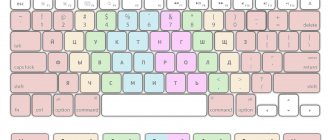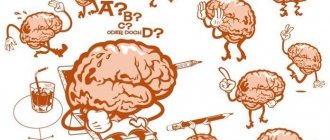How our brain remembers information
We receive information through the sensory senses - hearing, vision, taste, smell and touch. They help collect data, that is, perceive it. Immediately after we perceive information, we begin to remember it. This happens in 2 stages:
- Data enters short-term memory, where it is stored for several seconds.
- The entry of data into long-term memory, where it can be stored from several minutes to many years.
In the process of transferring information from perception to short-term memory, attention plays an important role - the amount of data that we can remember depends on it.
Information moves from short-term memory to long-term memory through repetition or association. The latter are of particular importance, since we connect all the concepts in memory with each other until they form a certain scheme.
The most effective method of memorization is association. If we have nothing to associate information with, then we must repeat it until it is memorized. What is the probability that we will remember the learned data? This depends on the proximity of the existing associations, the freshness of the information received and the frequency of its recall.
Stimuli that evoke certain memories in our brain are also important - these are visual images, sounds, smells, tactile sensations and the like.
Write down what you need to remember
How to quickly remember text? Make a cheat sheet. Yes, yes, this method from school and university works flawlessly, because in the process of writing you have at least 2 types of memory: visual and kinesthetic.
After this, it will be easier for you to reproduce the words in the correct sequence. The main thing is, don’t forget to first parse the text: read it carefully, highlight the main points, write it down and find the meaning of the words you don’t understand. When you understand the task and then write it down on paper, the reproduction of information will go smoothly.
TOP 15 tips for memorizing large amounts of information
How to remember large amounts of information?
Our intellect needs constant training to stay in shape! Vikium, a platform for training memory, attention and thinking, will help keep your brain in good shape. What attracts me here is the game form of training. There are quite a lot of online trainers, and new ones are often added.
There is also the opportunity to compete with other participants in who thinks, remembers and reacts faster . Training statistics are available, which can be compared with the achievements of other users.
Try it yourself - free registration!
We have collected 15 of the most effective tips that will help you learn to remember information, structure it and repeat data correctly. They were prepared by psychologists, neurologists, coaches and people with phenomenal memory who have used various methods to improve it. These tips will help you understand how to remember a large amount of information easily and how not to lose the information you have memorized.
Move from the general to the specific
Our brain perceives the whole picture better than its component parts. Therefore, when studying the course of a battle, you must first read its full description and only then move on to the details - dates, events, personalities and assessments.
Use rotation tactics
If you need to remember a huge amount of scattered information, try to alternate it. Are you preparing for exams in several subjects at once? It is best to divide the preparation into blocks, for example 30 minutes each, and alternate material on psychology with tests, say, in physics.
Engage your visual memory
It is a scientifically proven fact: our brain better assimilates information received through vision. Therefore, it is in your best interest to visualize the data. If you need to study a phenomenon, draw a diagram, learn words in a foreign language, make sketches of them.
Use mnemonic techniques
Associations are a more effective way of memorizing than repeated repetition. Therefore, it is worth using mnemonics techniques, rhyming, drawing parallels and associating memorized data with already known information. For example, you need to remember the number 1879. You break it down into two parts and make associations: 18 - I am 18 years old, 79 - my grandmother is 79 years old.
Approach learning from a mentor's perspective
The process of memorization is more effective if you explain the information received to someone, perhaps even to yourself. Therefore, approach your study from the position of a mentor and an expert.
Use the yellow marker method
Write notes or highlight the most important information in notebooks, printouts, books and manuals. The “yellow marker” method is based on the fact that we are much better at remembering data that stands out from the rest. It is often used in the press and is ideal for structuring and then memorizing large amounts of information.
Ensure dosed intake
Don’t try to grasp the immensity—memorizing the contents of three textbooks in a day is beyond the capabilities of even world memory champions. Break the information into blocks and ensure its dosed intake - organize a step-by-step study, which you will alternate with rest.
Increase your concentration
The effectiveness of the memorization process directly depends on concentration. If you are constantly distracted and unable to concentrate, then make it a rule to do several attention-enhancing exercises every day.
Don't miss: How to train memory and attention: TOP 10 ways
Focus on association
The process of memorizing a large amount of information should be based on associations. The brighter they are, the better. Draw parallels, use mnemonic techniques, try to see in the material as many similarities as possible with what you already know.
Repeat the material 3 times
The material studied should be repeated three times: the first - a few minutes after studying, the second - after 3-4 hours and the third - the next morning. Repetition three times with normal memory can provide almost guaranteed memorization.
Retell what you've learned
After studying a block of information, retell it. It’s better for real people, but you can do it for yourself. Try to speak as loudly as possible, with feeling and intonation. This will help connect emotional perception and remember the material faster.
Add your impressions
This advice follows from the previous one: the more emotions this or that information evokes in you, the faster it becomes etched in your memory. That's why it's worth trying to remember large amounts of data in unusual ways and in unusual places.
Increase your motivation
Motivation can affect concentration and internal discipline. You need to think and clearly understand all the benefits of memorizing the material. It is best to write them down in a column on a piece of paper.
Alternate study and physical activity
Cramming within four walls never brings the desired result. You need to alternate memorizing the material with physical activity - do no more than 2-3 hours in a row, after which take a walk, do exercises or do housework.
Avoid overload
Don’t overload yourself - this way you won’t remember even the amount of information that could remain in your head. If you need to prepare for an exam in 24 hours, focus on the most important points and save time on details. It is simply impossible to learn in 24 hours what you had to study for an entire semester.
Understand
Very often, people simply try to memorize unfamiliar words and phrases without even understanding their meaning. Perhaps this will be enough for several days, say, to pass an exam. Unless, of course, the lecturer asks you to explain what you mean by ablation and what are the signs of those same chromosomal aberrations from the first ticket.
The brain perfectly remembers words connected associatively. He discards incomprehensible letter combinations like garbage, not wanting to waste time on them.
For this reason, most people have difficulty learning foreign languages. A strange-sounding word does not bring to mind pictures that are familiar and understandable to the heart.
Therefore, for better memorization, you must first parse and understand all new terms. Try to feel the word and connect it in your imagination with familiar concepts.
How to help your brain work more productively
You can do everything right but not remember anything. Information will simply evaporate, the data you have just memorized will begin to get confused in your head, intertwined and replaced. The reason for this is that your brain is tired and unprepared. How to remember a large amount of information before an exam for which you are completely unprepared? Memorize short theses in notes, but under no circumstances sit through the night over a mountain of textbooks.
How to help your brain work more productively:
- get enough sleep - normal, healthy sleep of sufficient duration has a beneficial effect on the processes of memorizing information;
- do not study the material at night - a “working” night before an exam has always been the main mistake of students, because without rest the brain simply cannot remember anything;
- eat right - add carbohydrate fruits (for example, bananas), nuts and other foods that increase brain activity to your diet;
- add oxygen - it is vital for proper brain function, so ventilate the room as often as possible;
- Don’t forget about physical activity - scientists have repeatedly confirmed that people who alternate the process of studying with physical activity better remember and assimilate the material.
If you want to force your brain to work to its fullest and think that one night of textbooks will do nothing for it, then you are mistaken. Our physiology is this: without rest, productivity, and therefore brain activity, decreases. Therefore, after a night of studying notes, you may not only not remember the information you just memorized, but also forget the information that you knew perfectly well before the “night marathon.”
Repeat correctly
Our brains can be programmed - this is a scientific fact. To achieve a goal, it is necessary to understand it and work daily in the chosen direction. Therefore, if you have firmly decided that it is extremely important for you to learn English in six months, then your brain is already tuned in to intensive memorization. But in addition to regular training, regular repetition of the material covered is also important.
Use specific time intervals for best memorization: repeat the material immediately after studying, then after 15-20 minutes, after 6-8 hours (preferably before bed) and the last time after a week.
Mnemonics
This method is a set of techniques and methods that simplify the memorization of various information. It usually requires more effort to use effectively, but is better used in situations where you need to remember things like lists or structures. For example, if you need to remember a list of medications of a certain type, mnemonics will help you do this better than other methods.
Mnemonics is based on the formation of associative series and sequences when a person replaces abstract objects with real concepts. The main thing is to use bright, interesting associations.
In mnemonics, there are several most well-known techniques:
- Acronym: You make a combination of letters that “encrypts” the complete information for memorization.
- Acrostic: You create a poem in which the initial letters of the lines form a word.
- Keywords: You highlight key words in phrases. By remembering them, you restore the entire phrase in your memory.
- Rhyming: You make up rhymes to help you remember words or numbers.
- Image-name technique (suitable for remembering names): you come up with any clear connection between a person’s name and his physical characteristics.
- Chaining: You create a story in which the word or thought you want to remember causes a chain reaction and draws the next words with it.
System for memorizing numbers and cards - ChDP
We live in the 21st century, in the era of information technology. And we happily transfer many of our problems to machines. One of these problems is the need to remember information. Indeed, why do we need to remember our to-do list, groceries or any large amounts of data if all this is just a few clicks away? Despite this, many people try to improve their memory. This is convenient in everyday life and very useful: by forcing your brain to work in your youth, you will thank yourself in old age. In this article we will introduce you to a special system for memorizing numbers and cards called “Person - Action - Object” (PA). Read more…
4
Online program “Mnemonics”
In this online program, in just 5 weeks, with the help of special mnemonics and online simulators, you will learn to quickly and permanently remember names and faces, numbers, dates, birthdays, foreign words and much more. The program is ideal for schoolchildren and students, people whose work is related to analytics and who need to keep numerous lists and numbers in their heads, for those who often have to communicate with new people. It will also be useful for those who want to increase their level of erudition and intelligence, and also simply want to improve their memory. Find out more...
Like any other ability, memory can be trained, and it can be trained very, very successfully. All you need is desire and a certain amount of diligence. Get started right now and the results won’t take long to arrive!
We also recommend reading:
- Storytelling
- Forgetting curve
- Non-nemonic memorization rules
- Rules and ways to improve memory
- Mnemonics for beginners
- Spaced repetition method
- Types of memory and their features
- Visuospatial Corsi test: description and application
- How to train your memory
- 5 books that will make you a professional mnemonist
- 8 Scientific Ways to Improve Memory
Key words:1Mnemonics
Repeat at intervals
If you are looking for ways to quickly memorize text, this will not suit you. It activates long-term memory rather than short-term memory. But this information will stay with you for years. Scientists have found that after reading in the first hour, a person forgets up to 60% of the information received. So preparing for a presentation 24 hours in advance is not a good idea.
Therefore, it is important to remind the brain of the necessary information. Today, read the text and understand the unclear words. Tomorrow just read the text. You can do this once a day or a couple. But don’t bother yourself too much. Your main task is to read consciously every time.
Preparing for the upcoming load
How to prepare for the exam in 1 day? Only a student who is well versed in the subject can count on an excellent grade in a situation of emergency preparation. The goal of extremely rapid mastery of the material for an ordinary student is to avoid an unsatisfactory grade.
On the eve of the preparation day, it is advisable to get a good night's sleep, because in order to do everything in time, you will have to get up early. There is no need to have a too large breakfast, since the abundance of food uses most of the energy for digestion, and not for mental activity. Breakfast, as well as subsequent meals, should work to maximize learning efficiency. The following products improve IQ well:
- dark chocolate;
- berries (blueberries, raspberries, blackberries);
- seafood (salmon, tuna, oysters);
- nuts (walnuts, brazil), pumpkin seeds;
- seasonings (cinnamon, saffron, curry);
- fruits (avocados, apples, pears, apricots);
- vegetables (carrots, beets, spinach, cabbage).
It is recommended to drink coffee or citrus juice, as they have the ability to increase concentration.
To effectively prepare for the exam in 1 day and learn the tickets, you need to be well-prepared for fruitful work. You can conduct a short self-training by repeating positive statements to yourself several times. In order not to lose concentration, you need to remove all distractions: social networks, TV and phone. There should be nothing superfluous on the table other than supplies for fruitful study.
You can now open the list of exam questions and view them. It is recommended to start with the most complex and fundamental tickets, leaving the easy ones for later. In the morning, the memory is not overloaded and concentration is at the highest level, so the assimilation of difficult material will be faster and more effective.
Train your memory daily
There are memorization methods that help train your memory. Few people think about it and use them in everyday life, but they are extremely effective.
- Use poetry to improve your memory. Just learn poems, so your memory will work better.
- Change your usual routes, but use the navigator only for the first time. This way you will learn to remember routes and look for landmarks.
- Before going to bed, try to replay your day in your head, but in reverse. It's like Benjamin Button's day. Your memory will be trained by remembering minor events.
Types of memory and their features
Many people underestimate the importance of memory for self-development and reason like this: “Why train your memory if the main thing is not the quantity of memorized material, but its quality.” This is true, but research shows that by developing memory, you develop many different abilities: creative thinking, the ability to quickly process incoming information, the ability to keep several options in mind in order to choose the best, and much more. In this article we will look not only at all types of memory, but also show the importance of each of them. Read more…
9
Simplify the material
To quickly memorize difficult material, simplify it. For example, you need to write an essay on someone's scientific work. Read the entire material and understand every word so that you understand what is being said.
And then write down the main points that you consider the main thoughts in this work. And simplify them. Imagine having to explain this material to an eight-year-old child. How would you tell him?
When you simplify all the material, it will be much easier to remember, and terminology can be inserted after you understand the whole point.
Training is the best way to develop memory in a short time
You already know that successful memorization requires constant practice. I understand your situation, I know that you want to achieve everything in a short time. And since you are reading this article, I have an effective solution for you.
Now you can develop your memory not alone, but with a support group! For this purpose, experts on the Vikium website have prepared a course “100 names in 30 minutes.” This is a new program that consists of 9 lessons. After completing them, you will notice that you easily remember the names of new acquaintances, recognize long-forgotten comrades, and immediately remember a large number of names of a new group of people.
Vikium offers a 7-day money back guarantee!
This investment in yourself will pay off very quickly, and you will become much more productive.
In any case, friends, you have several options on which way to go: you can improve yourself or buy the “100 names in 30 minutes” course for little money and achieve results as quickly as possible.
You can also find other training options on the Vikium website. Try it, it's free. In any case, there is a guarantee that you will improve yourself and begin to remember much better. There is a review article on our blog, read:
- Brain simulators and courses Vikium - the most detailed and honest review of the online learning platform + reviews
Well, are we studying?











